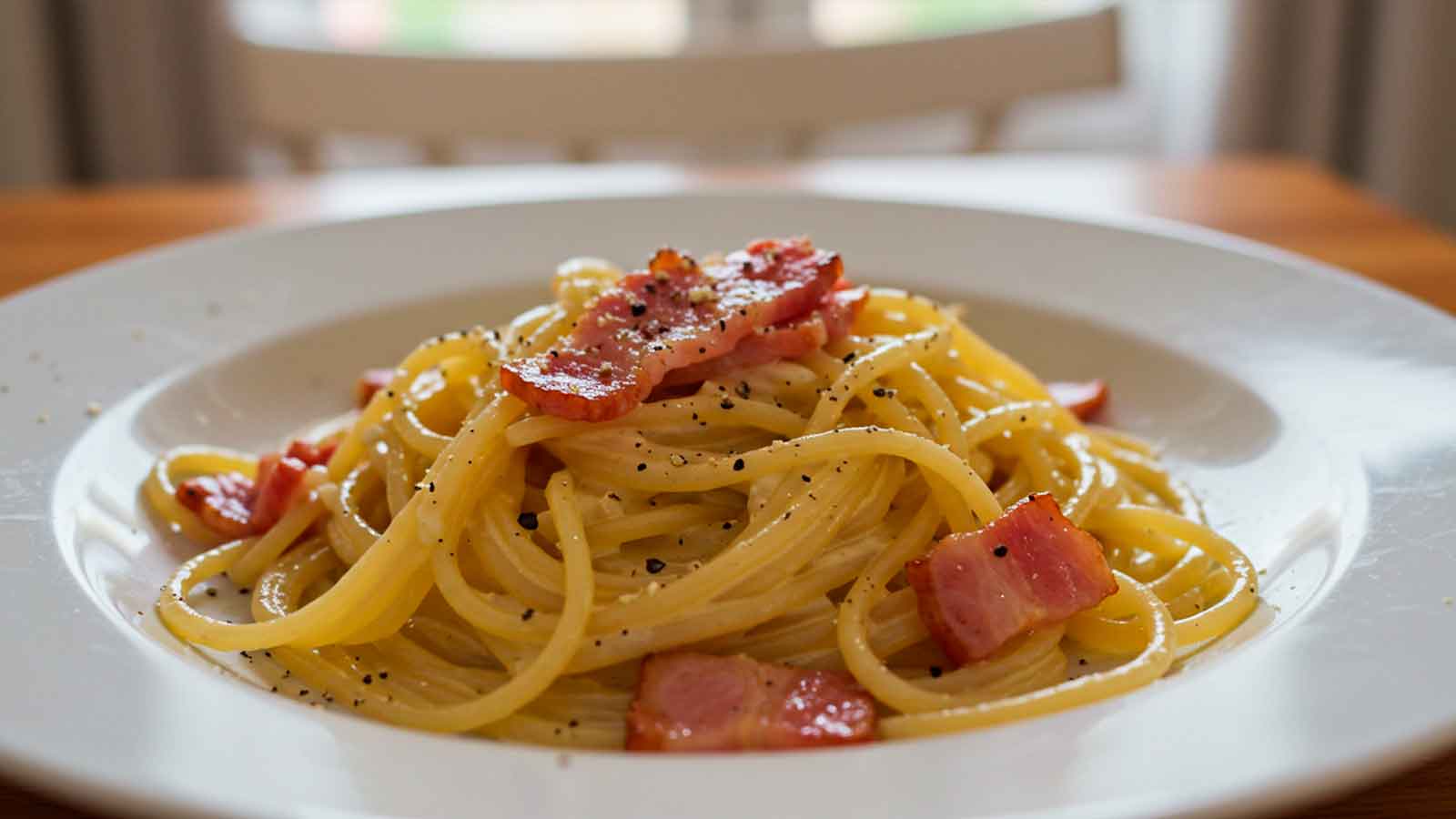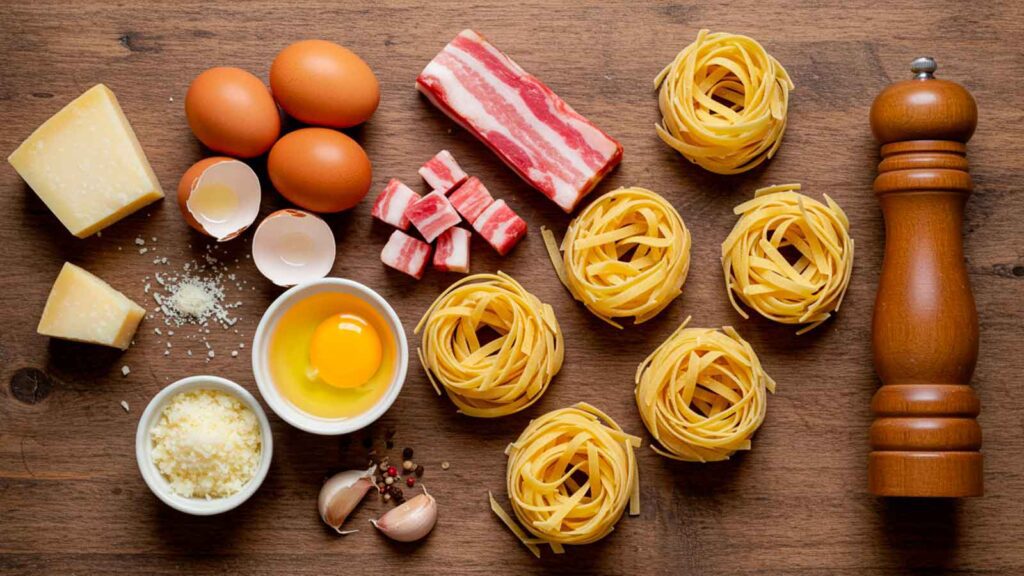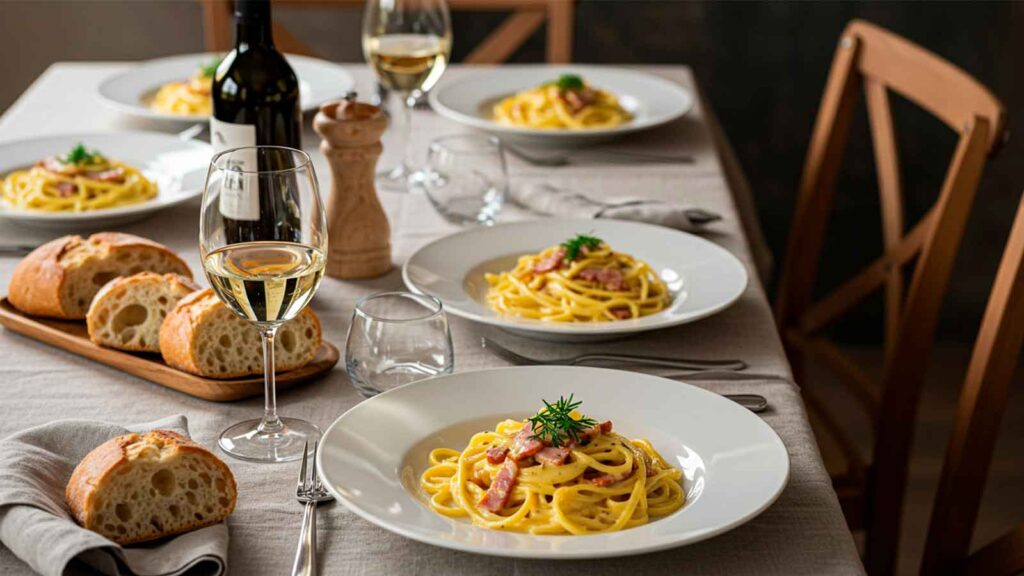Carbonara pasta is one of the most iconic dishes in Italian cuisine, renowned for its creaminess, simplicity, and striking flavor. In this article, we’ll explore its origins, curiosities, tips, and of course provide a detailed recipe with ingredient quantities in a list so you can prepare authentic carbonara pasta at home. Get ready to dive into this irresistible classic!
The History of Carbonara Pasta
Carbonara pasta emerged in Rome, probably between the end of World War II and the following years, when American soldiers brought bacon and eggs to Italy. Local cooks adapted these ingredients to the traditional guanciale (cured pork cheek), creating a unique recipe that quickly spread around the world.
The name carbonara may have come from the carbonari (charcoal workers), suggesting a rustic, easy-to-prepare dish, or from the generous grind of black pepper on top, reminiscent of charcoal dust.

Traditional Carbonara Pasta Recipe
Here’s the traditional recipe for making authentic carbonara pasta at home, following classic Roman methods.
Ingredients (serves 4)
- 400 g of spaghetti (or another long pasta of your choice)
- 150 g of guanciale (or pancetta/bacon if guanciale is unavailable)
- 4 large egg yolks + 1 whole egg
- 100 g of grated Pecorino Romano (or Parmesan if preferred)
- 1 teaspoon freshly ground black pepper
- Salt to taste (remember the cheese and guanciale are already salty)
- A little pasta-cooking water (about ½ cup)
Directions
- Cook the pasta:
Bring a large pot of salted water to a boil and cook the spaghetti until al dente. Reserve about ½ cup of the cooking water before draining. - Fry the guanciale:
While the pasta cooks, cut the guanciale into small cubes and fry in a large skillet over medium heat until golden and crisp. Turn off the heat and set aside. - Prepare the sauce:
In a bowl, whisk the yolks, whole egg, and grated cheese. Add the freshly ground black pepper and mix until you have a thick cream. - Combine everything:
Add the drained pasta straight into the skillet with the guanciale (off the heat). Toss well to coat the pasta in the guanciale fat. Then pour in the egg-and-cheese mixture, stirring quickly so the eggs don’t scramble and instead form a creamy sauce. - Adjust the texture:
If needed, add the reserved pasta water little by little until you reach the desired creaminess. - Finish and serve:
Top with extra grated cheese and freshly ground black pepper. Serve immediately to enjoy the perfect texture of carbonara pasta.

Tips to Perfect Your Carbonara Pasta
Use authentic ingredients
Whenever possible, use guanciale and Pecorino Romano. These ingredients are the soul of true carbonara pasta and make all the difference in the final flavor.
Control the temperature
Mix the eggs off the heat to prevent them from overcooking and turning into scrambled eggs. This care guarantees a silky, homogeneous sauce.
Don’t overdo the salt
Guanciale and cheese already bring plenty of salt to the dish. Taste before adding more.
Use pasta water
The cooking water contains starch and helps give body and shine to the sauce. Don’t skip this detail!
Variations of Carbonara Pasta
Carbonara with bacon
Outside Italy, many people use bacon instead of guanciale. Although not traditional, it’s a popular and tasty substitution.
Vegetarian carbonara
You can replace guanciale with sautéed mushrooms for a vegetarian version, keeping the dish’s texture and creaminess.
Carbonara with short pasta
Although spaghetti is the classic choice, shapes like penne or rigatoni also work well, especially for catching the sauce in their cavities.
Fun Facts About Carbonara Pasta
International recognition
Carbonara pasta has become a symbol of Italian cuisine worldwide, appearing on restaurant menus and in cookbooks across the globe.
Regional dispute
Some culinary historians believe the dish has origins outside Rome, but it was in the Italian capital that it took root and gained fame.
The secret is in the technique
Despite being a simple recipe, the success of carbonara pasta depends far more on correct technique than on exotic ingredients. Knowing when to add the eggs and how to toss the pasta is the real art of the dish.

FAQ About Carbonara Pasta
Can I use only egg yolks for the sauce?
Yes! Some traditional recipes use only yolks to ensure an even richer, creamier sauce.
Why isn’t heavy cream used?
Traditional carbonara pasta relies solely on eggs, cheese, and pasta water to form the sauce. Heavy cream is considered a shortcut and takes away the dish’s authenticity.
Can I make a lactose-free version?
Yes—simply use lactose-free cheese and substitute the guanciale with a plant-based alternative.
Can I make it with gluten-free pasta?
Of course! Many gluten-free pastas on the market work perfectly in carbonara pasta.
Which wine pairs best with carbonara?
Dry white wines such as Sauvignon Blanc or Chardonnay pair beautifully. If you prefer red, go for a light Pinot Noir.
Conclusion: A Dish to Fall in Love With
Carbonara pasta is more than just a recipe: it represents a culinary heritage that spans generations, bringing comfort and pleasure to the table. Making it at home is an experience worth having, both for the flavor and the connection with Italian tradition. Grab your pot, choose the best ingredients, and indulge in this timeless classic. Buon appetito!
READ ALSO:
- Buffalo Mozzarella: Irresistible Recipes and Tips for Using This Versatile Cheese
- How to Make Chicken Stroganoff: Unmatched Flavor
- Beet Orange and Carrot Juice: Flavor, Color, and Energy in Your Glass
- Parsley: 3 Incredible Recipes with This Versatile Ingredient
JOIN OUR RECIPE GROUP
WE’RE ON PINTEREST
I hope you enjoyed it.